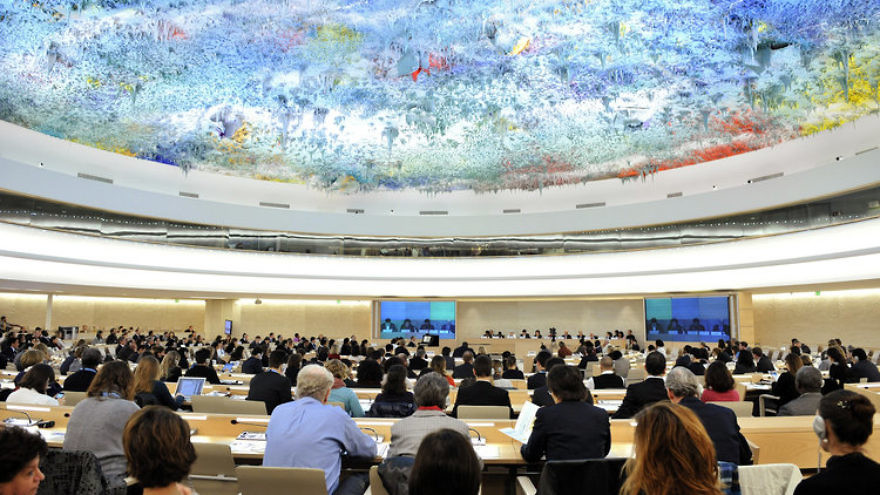Human Rights Council will strengthen its monitoring of the situation in Nicaragua
Geneva, June 19th, 2020. The UN Human Rights Council approved today a new resolution on Nicaragua that renews its mandate until March 2021 and strengthens the Office of the High […]

Geneva, June 19th, 2020. The UN Human Rights Council approved today a new resolution on Nicaragua that renews its mandate until March 2021 and strengthens the Office of the High Commissioner for Human Rights’s mandate to monitor the situation of serious human rights violations and to report on its findings at the 44th, 45th and 46th period of sessions of the Council.
The resolution “Promotion and protection of human rights in Nicaragua (A/HRC/43/L.35)”, which renews the resolution approved in March 2019 (A/HRC/40/L.8), allows the OHCHR to report on the situation in Nicaragua so that the member states of the Council can discuss new alternatives for solving the crisis and push for compliance with the recommendations given to the Nicaraguan State. Passage of the resolution was led by Canada, Costa Rica, Colombia, Paraguay, Brazil, Chile and Peru, with co-sponsorship from more than 40 countries and lobbying efforts by various civil society organizations.
Although the vote on the resolution was originally scheduled for March of this year, it was delayed until this month due to the COVID-19 pandemic. 24 countries voted in favor (Afghanistan, Argentina, Australia, Austria, Bahamas, Brazil, Bulgaria, Chile, the Czech Republic, Denmark, Fiji, Germany, Italy, Japan, the Marshall Islands, Mexico, the Netherlands, Peru, Poland , Republic of Korea, Slovakia, Spain, Ukraine and Uruguay), with 19 abstentions and only 4 votes against (Eritrea, Philippines, Somalia and Venezuela).
Content of the resolution
The resolution expresses grave concern “at the continuing reports of serious human rights violations and abuses since April 2018, and the persisting disproportionate use of force by the police to repress social protests,” as well as the reports of constant arrests, harassment and torture by the authorities.
It also urges the Government of Nicaragua to respect the rights to freedom of peaceful assembly, association and expression; respect the independence of the media and the judiciary; cease arbitrary arrests and detentions; release all individuals illegally detained unconditionally; ensure a safe and supportive environment for human rights defenders and to adopt a comprehensive, accountability-focused action plan that is inclusive of victims and survivors of the deadly violence of 2018.
Furthermore, it calls on the Government to resume its cooperation with the Office of the High Commissioner, the Human Rights Council and its mechanisms, the Organization of American States (OAS) and the Inter-American Commission on Human Rights (IACHR) “by granting unfettered access throughout the country and facilitating visits.”
With regards to elections, the resolution urges the Government and the relevant institutions to “undertake and implement legal and institutional reforms to ensure free, fair, transparent and credible elections, in accordance with international standards, that include the presence of independent national and international electoral observers.”
Other issues of concern in Nicaragua, such as the situation of indigenous and Afro-descendant communities in the Caribbean Coast region, displaced persons who do not have guarantees to return to the country and access to economic, social and cultural rights, were not considered in this resolution.
Voting
In the plenary session of the Council, several countries openly endorsed the resolution, among them Costa Rica, the Czech Republic representing the European Union, Peru, Australia, the Netherlands, Germany and Uruguay, whose representatives urged the Government of Nicaragua to adopt the recommendations previously provided by different human rights organizations, release political prisoners, implement electoral reforms, combat gender-based violence and protect indigenous peoples.
The representative of Costa Rica also called attention to the Nicaraguan authorities’ handling of the new coronavirus pandemic: “The Government of Nicaragua has failed to implement and promote real and effective measures to counter COVID-19 among its population. On the contrary, the irresponsibility shown by her government has exacerbated the extreme and negative human rights situation, particularly for those arbitrarily detained.”
The Venezuelan mission expressed in a video its refusal to approve the resolution because it considered it interventionist, while the Nicaraguan representative reserved the right to speak.

